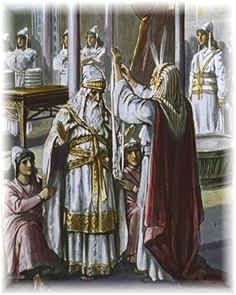
133:2 That ran down...that went down, etc Christ's grace is so diffusive of itself, that it conveys holiness to us, "running down from the head to the skirts", to all his members. He was not only anointed himself, but he is our anointer. Therefore it is called "the oil of gladness", because it rejoiceth our hearts, by giving us spiritual gladness, and peace of conscience.
135:6 In heaven and in the earth, etc. His power is infinite. He can do what he will do everywhere; all places are there named but purgatory; perhaps he can do nothing there, but leaves all that work for the Pope.
137:8 He that sows evil shall reap evil; he that soweth the evil of sin, shall reap the evil of punishment. So Eliphaz told Job that he had seen (Job 4:8), "they that plough iniquity, and sow wickedness, reap the same." And that either in kind or quality, proportion or quantity. In kind, the very same that he did to others shall be done to him; or in proportion, a measure answerable to it. So he shall reap what he hath sown, in quality or in quantity; either in portion the same, or in proportion the like. The prophet cursing Edom and Babel saith thus, "O daughter of Zion, happy shall he be that rewardeth thee as thou hast served us." The original is, "that recompenses to thee thy deed which thou didst to us." ... Thus is wickedness recompensed suo genere, in its own kind. So often the transgressor is against the transgressor, the thief robs the thief, proditoros proditor;as in Rome many unchristened emperors, and many christened popes, by blood and treason got the sovereignty, and by blood and treason lost it. Evil men drink of their own brewing, are scourged with their own rod, drowned in the pit which they digged for others, as Haman was hanged on his own gallows, Perillus tormented in his own engine!
As quoted in Spurgeon's Treasury of David








